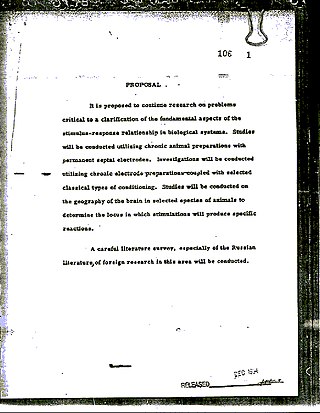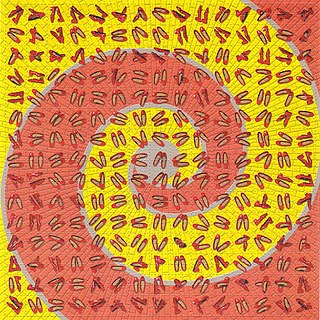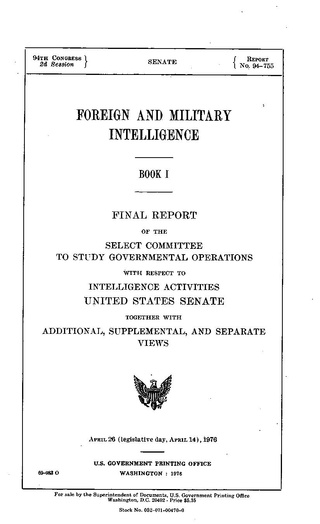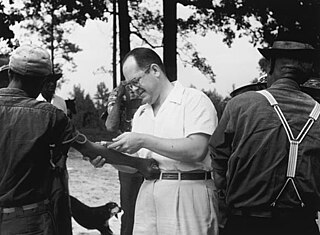Related Research Articles

Project MKUltra was a human experimentation program designed and undertaken by the U.S. Central Intelligence Agency (CIA) to develop procedures and identify drugs that could be used during interrogations to weaken individuals and force confessions through brainwashing and psychological torture. The term MKUltra is a CIA cryptonym: "MK" is an arbitrary prefix standing for the Office of Technical Service and "Ultra" is an arbitrary word out of a dictionary to denominate this project.
Sidney Gottlieb was an American chemist and spymaster who headed the Central Intelligence Agency's 1950s and 1960s assassination attempts and mind-control program, known as Project MKUltra.
Project Artichoke was a project developed and enacted by the United States Central Intelligence Agency (CIA) for the purpose of researching methods of interrogation. Project Artichoke was succeeded by Project MKUltra, which began in 1953.

Donald Ewen Cameron was a Scottish-born psychiatrist. He is largely known today for his central role in unethical medical experiments, and development of psychological and medical torture techniques for the Central Intelligence Agency. He served as president of the American Psychiatric Association (1952–1953), Canadian Psychiatric Association (1958–1959), American Psychopathological Association (1963), Society of Biological Psychiatry (1965) and the World Psychiatric Association (1961–1966).

Richard Schultz Schweiker was an American businessman and politician. A member of the Republican Party, he served as the 14th U.S. Secretary of Health and Human Services under President Ronald Reagan from 1981 to 1983. He previously served as a U.S. Representative (1961–1969) and a U.S. Senator (1969–1981) from Pennsylvania. In 1976, Schweiker was Reagan's running mate during his unsuccessful presidential campaign. He was not related to Pennsylvania governor Mark Schweiker.

The psychedelic drug lysergic acid diethylamide (LSD) was first synthesized on November 16, 1938, by the Swiss chemist Albert Hofmann in the Sandoz laboratories in Basel, Switzerland. It was not until five years later on April 19, 1943, that the psychedelic properties were found. Today, the discovery of LSD is celebrated worldwide during the annual Bicycle Day holiday, serving also as the day celebrating the psychedelic revolution in general.

The Church Committee was a US Senate select committee in 1975 that investigated abuses by the Central Intelligence Agency (CIA), National Security Agency (NSA), Federal Bureau of Investigation (FBI), and the Internal Revenue Service (IRS). Chaired by Idaho Senator Frank Church (D-ID), the committee was part of a series of investigations into intelligence abuses in 1975, dubbed the "Year of Intelligence", including its House counterpart, the Pike Committee, and the presidential Rockefeller Commission. The committee's efforts led to the establishment of the permanent US Senate Select Committee on Intelligence.
Louis Jolyon West was an American psychiatrist involved in the public sphere, known mainly for his work/involvement with the MKUltra project, a CIA mind control project in the late 1960s.

The United States President's Commission on CIA Activities within the United States was ordained by President Gerald Ford in 1975 to investigate the activities of the Central Intelligence Agency and other intelligence agencies within the United States. The Presidential Commission was led by Vice President Nelson Rockefeller, from whom it gained the nickname the Rockefeller Commission.
Psychic driving was a psychiatric procedure of the 1950s and 1960s in which patients were subjected to a continuously repeated audio message on a looped tape to alter their behaviour. In psychic driving, patients were often exposed to hundreds of thousands of repetitions of a single statement over the course of their treatment. They were also concurrently administered muscular paralytic drugs such as curare to subdue them for the purposes of exposure to the looped messages. The procedure was pioneered by Donald Ewen Cameron, and used and funded by the CIA's Project MKUltra program in Canada.
William Thetford was an American psychologist, medical psychologist and professor. He is best known for his collaboration with Helen Schucman in typing the original manuscript and being on the editing team for A Course in Miracles (ACIM), a self-study curriculum in spiritual psychology. He died in 1988, aged 65, in Tiburon, California, after having made his involvement with the ACIM material and its study the most central focus of his life.
Pharmacological torture is the use of psychotropic or other drugs to punish or extract information from a person. The aim is to force compliance by causing distress, which could be in the form of pain, anxiety, psychological disturbance, immobilization, or disorientation.
Operation Midnight Climax was an operation carried out by the CIA as a sub-project of Project MKUltra, the mind-control research program that began in the 1950s. It was initially established in 1954 by Sidney Gottlieb and placed under the direction of the Federal Bureau of Narcotics in Boston, Massachusetts with the "Federal Narcotics Agent and CIA consultant" George Hunter White under the pseudonym of Morgan Hall. Dr. Sidney Gottlieb was a chemist who was chief of the Chemical Division of the Office of Technical Service of the CIA. Gottlieb based his plan for Project MKUltra and Operation Midnight Climax off interrogation method research under Project Artichoke. Unlike Project Artichoke, Operation Midnight Climax gave Gottlieb permission to test drugs on unknowing citizens, which made way for the legacy of this operation. Hundreds of federal agents, field operatives, and scientists worked on these programs before they were shut down in the 1960s.

The Central Intelligence Agency (CIA) is a civilian foreign intelligence service of the United States federal government, tasked with gathering, processing, and analyzing national security information from around the world.

Numerous experiments which were performed on human test subjects in the United States in the past are now considered to have been unethical, because they were performed without the knowledge or informed consent of the test subjects. Such tests have been performed throughout American history, but have become significantly less frequent with the advent and adoption of various safeguarding efforts. Despite these safeguards, unethical experimentation involving human subjects is still occasionally uncovered.
Harold George Wolff was an American doctor, neurologist and pseudoscientist who conducted intentionally harmful and brain-damaging pseudoscientific human experimentation. He is generally considered the father of modern headache research, and a pioneer in the study of psychosomatic illness.

Acid Dreams: The Complete Social History of LSD: the CIA, the Sixties, and Beyond, originally released as Acid Dreams: The CIA, LSD, and the Sixties Rebellion, is a 1985 book by Martin A. Lee and Bruce Shlain, in which the authors document the 40-year social history of lysergic acid diethylamide (LSD), beginning with its synthesis by Albert Hofmann of Sandoz Pharmaceuticals in 1938. During the Cold War period of the early 1950s, LSD was tested as an experimental truth drug for interrogation by the United States intelligence and military community. Psychiatrists also used it to treat depression and schizophrenia. Under the direction of Sidney Gottlieb, the drug was used by the Central Intelligence Agency (CIA) in cooperation with participating "colleges, universities, research foundations, hospitals, clinics, and penal institutions". LSD was tested on "prisoners, mental patients, volunteers, and unsuspecting human subjects".
Unethical human experimentation is human experimentation that violates the principles of medical ethics. Such practices have included denying patients the right to informed consent, using pseudoscientific frameworks such as race science, and torturing people under the guise of research. Around World War II, Imperial Japan and Nazi Germany carried out brutal experiments on prisoners and civilians through groups like Unit 731 or individuals like Josef Mengele; the Nuremberg Code was developed after the war in response to the Nazi experiments. Countries have carried out brutal experiments on marginalized populations. Examples include American abuses during Project MKUltra and the Tuskegee syphilis experiments, and the mistreatment of indigenous populations in Canada and Australia. The Declaration of Helsinki, developed by the World Medical Association (WMA), is widely regarded as the cornerstone document on human research ethics.
The Montreal experiments were a series of experiments, initially aimed to treat schizophrenia by changing memories and erasing the patients' thoughts using the Scottish psychiatrist Donald Ewen Cameron's method of "psychic driving", as well as drug-induced sleep, intensive electroconvulsive therapy, sensory deprivation and Thorazine. The experiments were conducted at the Allan Memorial Institute of McGill University between 1957 and 1964 by Cameron and funded by the CIA as part of Project MKUltra, which lasted until 1973 and was only revealed to the public in 1975.
References
- ↑ Price, David H. (June 2007). "Buying a piece of anthropology Part 1: Human Ecology and unwitting anthropological research for the CIA". Anthropology Today. 23 (3). John Wiley & Sons: 8–13. doi:10.1111/j.1467-8322.2007.00510.x . Retrieved 15 September 2024.
- 1 2 Price, H; David (2007). "Buying a Piece of Anthrology Part 1: Human Ecology and Unwitting Anthropological Research for the CIA". Anthropology Today. 23 (3): 8–13. doi:10.1111/j.1467-8322.2007.00510.x.
When Cornell University had hired an anthropologist before learning that the CIA security office would not give her clearance,[Harold] Wolff simply lied to her about where the money came from
- ↑ "1957 Annual Report of Society for the Investigation of Human Ecology" (PDF). Blinken OSA Archivum. 1957. Archived (PDF) from the original on 25 August 2020. Retrieved 23 September 2024.
- ↑ Schachtner, Jim (17 April 1980). "Documents disclose CIA research" (PDF). Retrieved 23 September 2024.
- ↑ Thomas, Jo (3 August 1977). "Extent of University Work for CIA Hard To Pin Down" (PDF). CIA Reading Room. Retrieved 23 September 2024.
- ↑ Goshko, John (3 August 1977). "Geschickter Research Fund Tightly Controlled By The Founder" (PDF). CIA Reading Room. Retrieved 23 September 2024.
- ↑ Horrack, Nicholas (4 August 1977). "80 Institutions Used In CIA Mind Control Studies" (PDF). CIA Reading Room. Retrieved 23 September 2024.
- ↑ Intelligence, United States Congress Senate Select Committee on (1977). Project MKULTRA, the CIA's Program of Research in Behavioral Modification: Joint Hearing Before the Select Committee on Intelligence and the Subcommittee on Health and Scientific Research of the Committee on Human Resources, United States Senate, Ninety-fifth Congress, First Session, August 3, 1977. U.S. Government Printing Office.